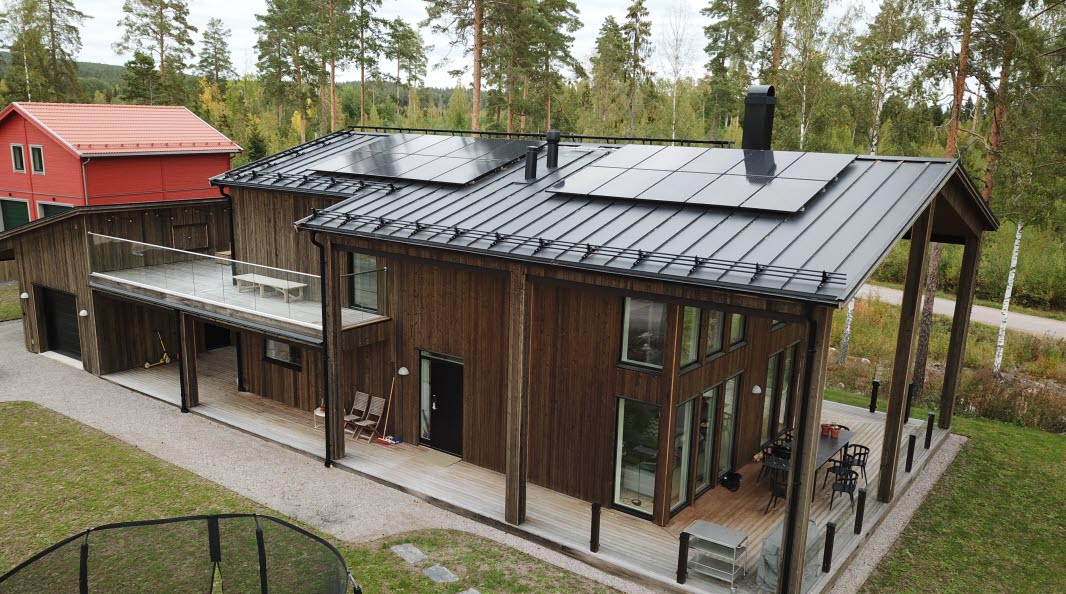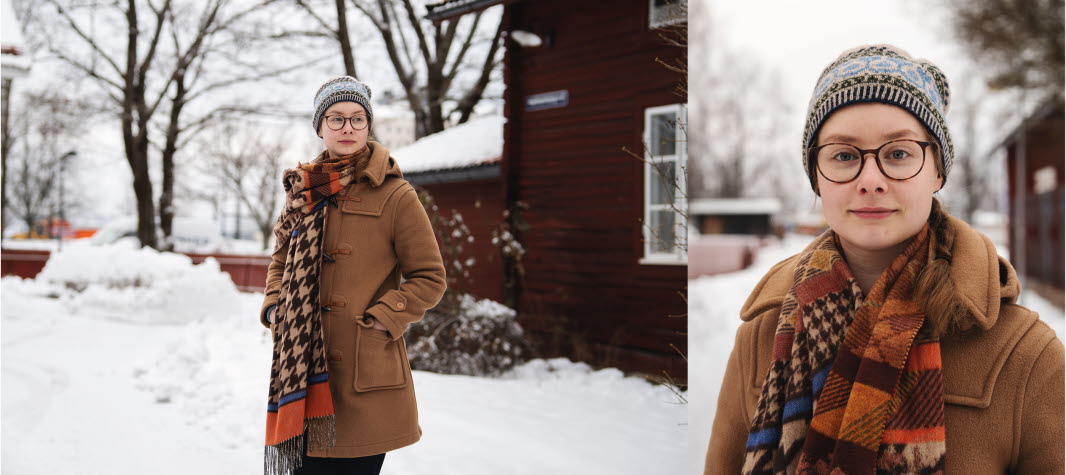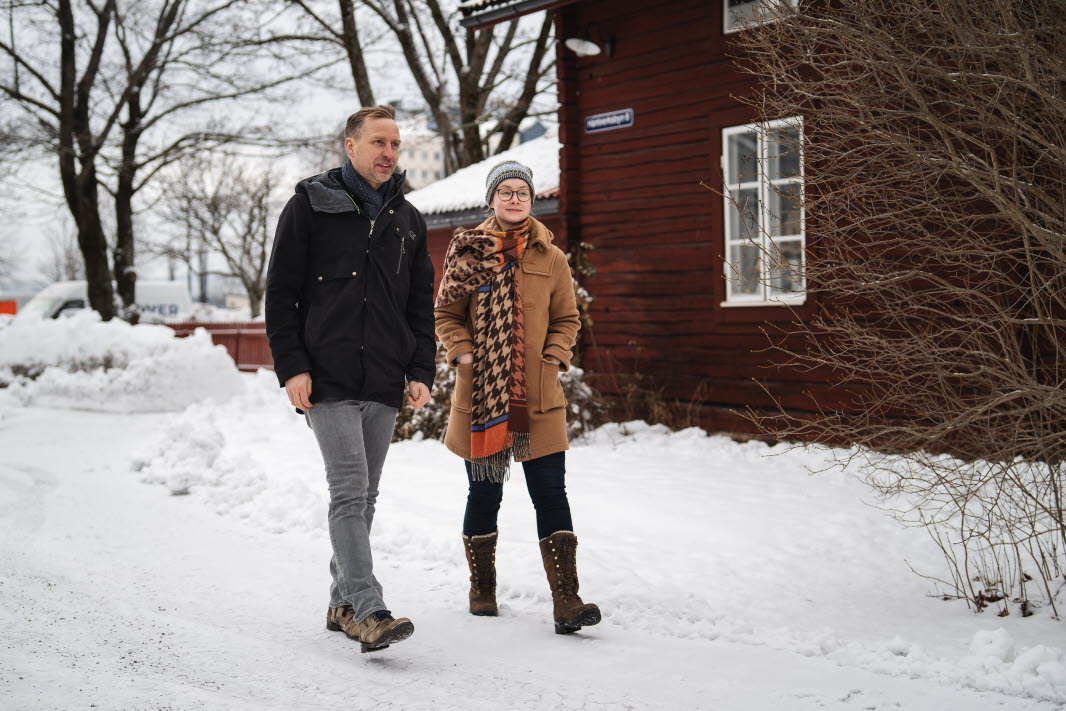
We aim to equip you with the skills and competence you need to be able to work towards lowering the whole life-cycle carbon footprint of buildings while ensuring comfortable living conditions for occupants.
Open to both on campus and online students, the programme will introduce you to innovative design concepts and novel approaches to help you tackle both current and future environmental and societal challenges.
Should you apply?
You are strongly advised to apply to this programme if you are interested in working with green buildings and energy-efficient construction or if you would like to become a field specialist in advising homeowners, businesses, and local authorities on questions related to environmental and energy-conscious solutions.
We also welcome ERASMUS exchange students to attend our courses every year. Please contact the programme director to learn more about applying to study courses in the programme as an exchange student.
What will you study?
You can study this programme at our Borlänge Campus or online. If studying online, you can follow most of the lessons in real time from home or watch recordings at your convenience.
All students are expected to participate in laboratory sessions or similar on campus a few times each semester and are invited to regular site visits to our industry partners.
Programme Structure and Content
Developed from Dalarna University’s years of extensive research in the fields of construction technology and energy technology, the programme comprises 60 credits (1 credit = 1 ECTS).
All courses are taught in English by international faculty.
Semester 1 (September-January)
- Energy-Efficient Buildings
- Solar Radiation and Solar Geometry
- Introduction to Bio-Climatic Design
- Building Energy Performance Simulation and Analysis
- Solar Building Design
- Low-Energy HVAC Systems
Semester 2 (January-June)
- Energy and Urban Planning
- Life Cycle Assessment and Cost Analysis
- Sustainable Building Rating Systems
- Thesis Work in Energy Efficiency in the Built Environment
We regularly assess the programme content and structure to ensure that it delivers the state-of-the-art knowledge and skills essential for you to enter the job market with confidence.
Our main goals for the coming years are to incorporate more hands-on problem-solving exercises and to introduce you to basic, Sweden-specific construction technologies. The programme concludes with the writing of a thesis. The thesis work can be carried out at the University or, upon approval, at a business or other organisation in Sweden or abroad.
Degree Awarded
Master of Science Degree (60 Credits) in Energy Efficient Built Environment
Research and industry collaboration in Energy Efficient Built Environments
Our partners in research and industry provide you with real-world problems, hands-on experience and good potential for employment upon graduation. The construction sector is particularly strong in Dalarna, and many local businesses and organisations maintain excellent contact with the University.
Dalarna University, together four other Swedish Universities and RISE (Research Institutes of Sweden AB) , has been granted a five-year grant from the Swedish Energy Agency to form a competence center for solar energy, called Solelforskningscentrum Sverige (SOLVE). This creates a strategic partnership between Sweden's research base in solar technologies and a broad and committed group of actors in the public and private sector.
Besides the opportunity to embark upon an industry-delivered research project in your thesis, we also aim to give you the opportunity to cultivate close connections with the industry through visits to construction sites, cutting-edge facilities, and innovative companies, and insight into pioneering projects. You will also attend lectures by guest speakers who have expertise in such areas as district heating and cooling, solar engineering, sustainable urban planning, and climate-conscious urban design. These activities will serve to increase your awareness of the latest research and development trends in this expansive field.
After graduation (work and further study opportunities)
Career Opportunities
The Master's Programme in Energy Efficient Built Environment will prepare you to be a professional working towards the delivery of energy-efficient solutions for the built environment.
Potential future employers are as follows:
- consultancy firms
- housing companies
- leading design and construction firms
- government and non-government organisations
Worldwide, there is a growing need for qualified professionals in this field who have a working knowledge of energy efficiency and the carbon footprint assessments of buildings (minimising upfront carbon embodied in building materials, lowering operational energy use, and saving carbon at the end-of-life stage through the reuse of materials). For you as a graduate, this means that you will enjoy great flexibility when it comes to putting your expertise into use within various fields of civil, environmental and construction engineering.
Programme content focuses on energy-efficiency challenges in both cold and temperate climates. The knowledge and skills you acquire from your studies will make you an attractive candidate within the construction industry in Europe, North America and China. Furthermore, the international character of the programme – in terms of both students and faculty – will not only prepare you to work in an international environment but also enable you to build a worldwide professional network.
Increasing Job Opportunities
In the global challenge presented by climate change, governments are increasingly under pressure to transition to renewable energy resources and to improve the energy efficiency of their built environment and thus, to curb their greenhouse gas emissions. While the number of professionals who are prepared to tackle this issue in its complexity is steadily growing, Sweden is leading the way in developing and adopting energy-efficient and environmentally-friendly technologies; studying here can provide you with a competitive advantage in this increasingly global job market.
Study at the PhD level
You can also pursue your studies at the doctoral level by taking Dalarna University's doctoral programme in Resource Efficient Built Environment.
Stay in Dalarna and look for a job after graduating
You can apply for a 12-month residence permit to stay in Sweden and look for work after you complete a degree programme of at least 60 credits. International students are encouraged to stay in Dalarna and look for a job after graduating from the Master's Programme in Energy Efficient Built Environment.
Using your degree overseas
The degree awarded by Dalarna University for this programme is internationally recognized and has been used by previous students to attain employment or pursue further studies outside of Sweden.
You can also apply to receive an Erasmus+ grant for an internship, even up to 12 months after completing your studies. This opportunity is available to all students in the programme, regardless of nationality, who pursue an approved internship within an Erasmus+ programme country other than Sweden.
What can you expect when studying this programme?
Dalarna University is a small university, which means you will readily get to know your classmates and teachers. You will study at Campus Borlänge or online and all classes are designed so that students on campus and online interact with one another.
Borlänge is located two hours north of Stockholm and 20 km from the historic town of Falun, the political centre of the County of Dalarna. Borlänge is characterised by thriving business and industry, and surrounded by the stunning Swedish countryside. Dalarna is hometo such major corporations as SSAB, Hitachi Energy and Clas Ohlsson.
Throughout your studies, you will attend lectures, complete practical exercises and laboratories, work on individual and group projects, participate in seminar discussions, make fields trips, and take exams. Each week, you can expect to have 10 to 20 hours of class time and 30 to 40 hours of study time outside of class.
About 10 - 15 students study this programme on campus and an additional 25 - 35 study online. Often our students have different disciplinary backgrounds and are from countries the world over. Such diversity in the classroom allows for a stimulating exchange of knowledge and experience, and not least enriched learning.
Several of our courses are interdisciplinary with the Master's Programme in Solar Energy Engineering. This factor serves to increase both networking opportunities and interdisciplinary exchange. The knowledge you gain and the connections you build, both inside and outside the classroom, will help you in your professional endeavours
Check your eligibility and what documents to submit when applying
Specific Entry Requirements
- Bachelor of Science from the construction-related field (architectural, building, mechanical, energy, or civil engineering) or equivalent of at least 180 credits (ETCS), or an equivalent degree. It is also possible to apply if you are currently completing the final year of studies leading to such a degree.
- Documented English language proficiency equivalent to English B/English 6 at Swedish upper-secondary school (more information below).
Documents to Submit:
- Proof of a completed bachelor’s degree, equal to a Swedish bachelor's degree in one of the approved subject areas. If you are currently completing a degree you can apply please submit a certificate from your university.
Be sure to read the information specific to the country where you previously studied to know how to submit the appropriate documents. - Proof of English language proficiency equal to an IELTS result of 6.5 overall with no part of the test below 5.5
In some cases your previous studies may fulfill the English proficiency requirement. Please check the University Admissions information on English Language Proficiency to see if you are required to submit a TOEFL or IELTS test result.
If you have taken an English proficiency test that fulfills the requirements listed on the UniversityAdmissions.se website then you can ignore the information below.
For 2025, Dalarna University has made a temporary local exemption to the English proficiency requirements listed on the UniversityAdmissions.se website.
If you previously studied in India or Sri Lanka
Applicants from India and Sri Lanka should submit your upper-secondary documents to show your English proficiency as explained on the UniversityAdmissions website.
This will fulfill the formal English proficiency requirements for most courses and programmes at Swedish universities.
If you do not have the required proof of English proficiency from your upper-secondary studies and you have completed a 4-year bachelor’s degree majoring in a technical or science subject (such as engineering, IT or physics) which is equal to a Swedish bachelor’s degree, then you will not need to submit a TOEFL or IELTS result.
If you previously studied in Nepal
If you have not taken a TOELF or IELTS and you have completed a 4-year bachelor’s degree majoring in a technical or science subject (such as engineering, IT or physics) which is equal to a Swedish bachelor’s degree, then you will not need to submit a TOEFL or IELTS result.
Tuition fees and scholarships
Tuition Fees
150,000 SEK (total)*
*EU/EEA citizens are not required to pay tuition fees.
Tuition fees are paid in one-semester installments and the first payment (75,000 SEK) should be made as soon as possible after you have received your invoice and no later than the deadline on the invoice. This allows for reasonable processing time for a residence permit application. The second payment (75,000 SEK) is submitted before the start of the second semester.
Visit our Tuition Fee website for more information about paying tuition fees and what is included in the fee.
If you have any questions about tuition fee payments, please e-mail tuitionfees@du.se.
Scholarships
There are a number of scholarships available for successful non-EU/EEA applicants to the Energy Efficient Built Environment programme.
For more information about scholarships, please visit our webpage about international student scholarships or contact us using the contact form on this website.
She was certain – studies were not for her. Now she is a doctoral student. When she chose to study at Dalarna University, Marieke Rynoson changed the course of her future and what is more, the skills and knowledge she has so far acquired through her studies are in high demand.
From northern Germany, Marieke grew up in a family that every summer headed north to Sweden. Huddled in the back seat of the family car, between luggage and her father's parachuting gear, she could hardly have imagined that one day she would call the county of Dalarna in central Sweden her home.

After upper-secondary school, Marieke thought her academic life was behind her: she wanted to work with something concrete, something practical. So it was that she began an apprenticeship as a church painter, a job where her interest in historical buildings came into play and where practical work featured strongly. Her curiosity grew for the renovation of old buildings, which then led her to pursue studies in construction engineering. The next thing to happen is that she meets Rikard, a mason, and moves to Säter, a small town in Dalarna.
Age: 29
Background: church painter, Bachelor's degree in Construction Engineering, Master's degree in Energy Efficient Built Environment
Interests: Makes her own clothes
Current position: Doctoral student in the field of energy efficiency
At first she wondered what she would do in Sweden and whether she would be able to put her education to good use. She soon found out that Dalarna University at its campus in nearby Borlänge offered a Master’s programme in energy-efficient construction, a perfect match with her previous knowledge as well as her interest in sustainable living.
- It felt like it was meant to be – that I was supposed to end up here just so that I could take this programme, says Marieke.
She soon found out that returning to student life after several years as a working professional was an easier transition than she might have imagined.
- A small university like Dalarna University really suits me: here you get to know everyone. People treat each other like equals, regardless of whether they’re a professor or a student. We get the sense that our teachers really want to see us be successful.
Her university instructor Jonn Are Myhren nods in agreement.
- We study issues related to a sustainable society, an issue that is always relevant. Our students' knowledge must always be up-to-date, and they need to follow developments as they happen. This is where our research contributes a great deal, says Jonn Are, who is director of the Master's Programme in Energy Efficient Built Environment.
Jonn Are and Marieke agree that the development and design of future energy-efficient buildings and homes are together an important social issue, one that many companies have an interest in as well, something that has not gone unnoticed.
- During the programme, we got to make regular visits to companies, which meant students got to meet a number of potential employers. It also meant that all the theory we learned was put into practice. This increased our motivation because it became clear that our skills are in demand, says Marieke.

When Marieke had completed her Master’s, she looked forward to working with the analysis of buildings to see how they could be made more energy efficient. She also wanted to combine her interest in old buildings with her new knowledge and skills in a practical way.
- But then one of my teachers asked me if I’d ever considered doing research. "What, me?" was my spontaneous response. But that's how it all began, she laughs.
Her teacher had noticed Marieke's commitment and interest during her studies and saw an opportunity for her to acquire even deeper knowledge. Over the four years to come, Marieke will study the integration of solar cells in the energy systems of buildings. What happens after that is something Marieke has yet to give any thought to. However, her interest in old buildings – the former church painter that she is – and her knowledge of how energy efficiency can be created are aspects that she hopes she can apply to her own house one day.
– My studies opened up opportunities I didn't even know I had, she says. Here I am now – somebody who didn’t plan to study at all, and now it's my job – to study! Life can always take you down surprising new paths.
